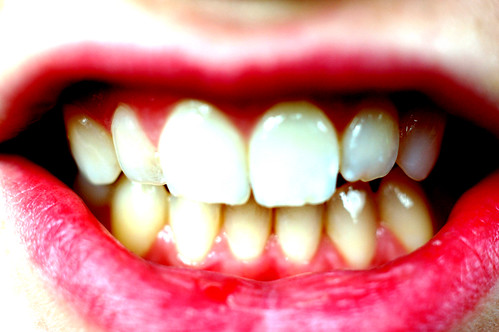The Role of Coenzyme Q10 in Oral Health
In my last post, I mentioned that I would go through the ingredient list in the toothpaste I'm testing and present the studies associated with their effect on gums and teeth. First up is coenzyme Q10, which I'm also taking internally for another experiment.
The earliest study on CoQ10 and periodontal disease measured levels of CoQ10 in gingival tissues and reported that the levels were significantly lower in subjects with periodontal disease. The results were confirmed in a later study from 1974. This suggests that a deficiency in CoQ10 can cause problems in mouth health, but does not necessarily mean that taking more CoQ10 will fix problems in non-deficient subjects.
In one study from 1975 a patient with severe periodontal disease was treated with CoQ10. Apparently it was administered orally and was effective in reducing the symptoms after eight weeks. Another study from the same year studied eight patients with periodontitis and concluded that periodontal pocket depth decreased after only 5-7 days. The healing was viewed as "extraordinarily effective". The different forms of CoQ were administered orally instead of topically.
Three of the five researchers listed in that study did another study a year later, this time with eighteen patients with periodontal disease. Only CoQ10 was used. Again, the periodontal pockets improved in the group taking CoQ10 compared to the placebo group.
In a newer study from 2003, ten male patients were given topical CoQ10 once a week for six weeks. After three weeks, significant improvements in gingival index and bleeding on probing were seen only in the periodontal pockets that CoQ10 was applied to.
In addition to these studies, there is a patent claim from 2002 that suggests dissolving lozenges containing CoQ10 are effective in inhibiting microbial growth in gingival tissue.
Unfortunately, the amounts of CoQ10 administered orally are not available in the abstracts, so it's difficult to say how much is needed to see results. However, I doubt that they are much larger than the 200 mg I'm taking, as this is the highest amount per capsule I have seen on the market. Then again, I've yet to see any improvements in gum health (more spesifically, the one gingival pocket), and I've taken it for a lot longer than the subjects in the studies. Either oral CoQ10 only works in patients with severe periodontitis, or very high quantities are needed, or the studies are somehow flawed.
Interestingly, when CoQ10 is administered topically, it is usually mixed with soybean oil, which is one of the ingredients in the gel capsules; so, in theory, my first idea of opening the capsules and rubbing the contents on my gums might not have been such a bad thought after all. For now, however, I'm sticking with the toothpaste.
For more information on coenzyme Q10 and oral health, see these posts:
Coenzyme Q10, Exercise and Oxidative Stress
Coenzyme Q10 for Exercise & Better Health - Experiment Conclusion
Dental Health Effects of Green and Black Tea
Whitening Teeth & Healing Gums: In Search of the Perfect Toothpaste
Read More......









